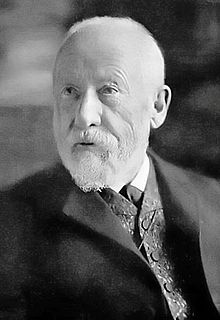Wilhelm Dilthey: Perbedaan antara revisi
k r2.6.4) (bot Menambah: hu:Wilhelm Dilthey, kk:Вильгельм Дильтей |
|||
| Baris 30: | Baris 30: | ||
==Neo-Kantians== |
==Neo-Kantians== |
||
Dilthey's ideas should be examined in terms of his similarities and differences with [[Wilhelm Windelband]] and [[Heinrich Rickert]], members of the [[Baden School]] of [[Neo-Kantianism]]. Dilthey was not a Neo-Kantian, but had a profound knowledge of [[Immanuel Kant]]'s philosophy, which deeply influenced his thinking. But whereas Neo-Kantianism was primarily interested in epistemology on the basis of [[Kant]]'s ''Critique of Pure Reason'', Dilthey took [[Kant]]'s ''Critique of Judgment'' as his point of departure. An important debate between Dilthey and the Neo-Kantians concerned the "human" as opposed to "cultural" sciences, with the Neo-Kantians arguing for the exclusion of psychology from the cultural sciences and Dilthey for its inclusion as a human science. --> |
Dilthey's ideas should be examined in terms of his similarities and differences with [[Wilhelm Windelband]] and [[Heinrich Rickert]], members of the [[Baden School]] of [[Neo-Kantianism]]. Dilthey was not a Neo-Kantian, but had a profound knowledge of [[Immanuel Kant]]'s philosophy, which deeply influenced his thinking. But whereas Neo-Kantianism was primarily interested in epistemology on the basis of [[Kant]]'s ''Critique of Pure Reason'', Dilthey took [[Kant]]'s ''Critique of Judgment'' as his point of departure. An important debate between Dilthey and the Neo-Kantians concerned the "human" as opposed to "cultural" sciences, with the Neo-Kantians arguing for the exclusion of psychology from the cultural sciences and Dilthey for its inclusion as a human science. --> |
||
== Bacaan lebih jauh == |
== Bacaan lebih jauh == |
||
* [[Rudolf A. Makkreel]], ''Dilthey: Philosopher of the Human Studies'' (Princeton: Princeton University Press, 1993). |
* [[Rudolf A. Makkreel]], ''Dilthey: Philosopher of the Human Studies'' (Princeton: Princeton University Press, 1993). |
||
Revisi per 7 Oktober 2011 16.25

Wilhelm Dilthey (19 November 1833 – 1 Oktober 1911) adalah seorang sejarahwan, psikolog, sosiolog, siswa hermeneutika, dan filsuf Jerman. Dilthey dapat dianggap sebagai seorang empirisis, berlawanan dengan idealisme yang meluas di Jerman pada waktu itu, tetapi penjelasannya tentang apa yang empiris dan eksperiensial berbeda dengan empirisisme Britania dan positivisme dalam asumsi-asumsi epistemologis dan ontologis sentralnya, yang diambil dari tradisi-traidisi sastra dan filsafat Jerman.
Hermeneutika
Dilthey diilhami sebagian oleh karya-karya Friedrich Schleiermacher tentang hermeneutika, yang ia ikut hidupkan kembali. Kedua tokoh ini terkait dengan Romantisisme Jerman. Aliran hermeneutika Romantis menekankan bahwa para penafsir yang tertanam (embedded) secara historis — seorang subyek yang "hidup" dan bukan subyek Cartesian atau "teoretis" — menggunakan 'pemahaman' dan 'interpretasi', yang menggabungkan deskripsi dan analisis individual-psikologis dan sosial-historis, untuk memperoleh pengetahuan yang lebih dalam tentang teks dan penulisnya di dalam konteks mereka.
Bacaan lebih jauh
- Rudolf A. Makkreel, Dilthey: Philosopher of the Human Studies (Princeton: Princeton University Press, 1993).
- Jos de Mul, The Tragedy of Finitude: Dilthey's Hermeneutics of Life (New Haven: Yale University Press, 2004).
Wilhelm Dilthey: Selected Works diterbitkan oleh Princeton University Press, dengan editor pakar Dilthey yang terkemuka Rudolf A. Makkreel dan Frithjof Rodi. Buku-buku yang telah terbit termasuk:
- Volume I: Introduction to the Human Sciences
- Volume III: The Formation of the Historical World in the Human Sciences
- Volume IV: Hermeneutics and the Study of History
- Volume V: Poetry and Experience
